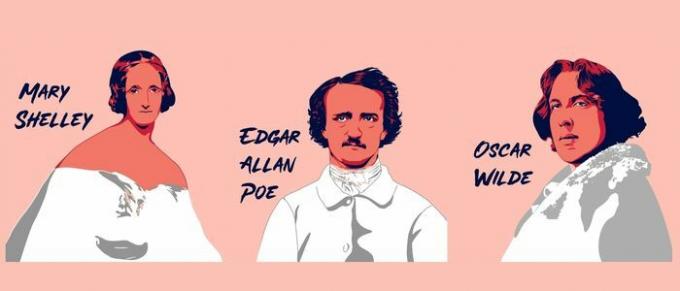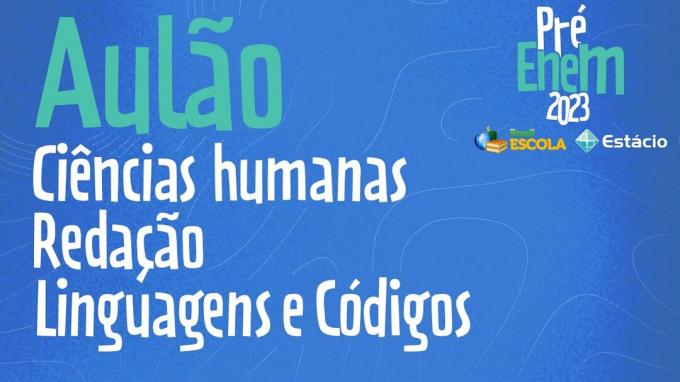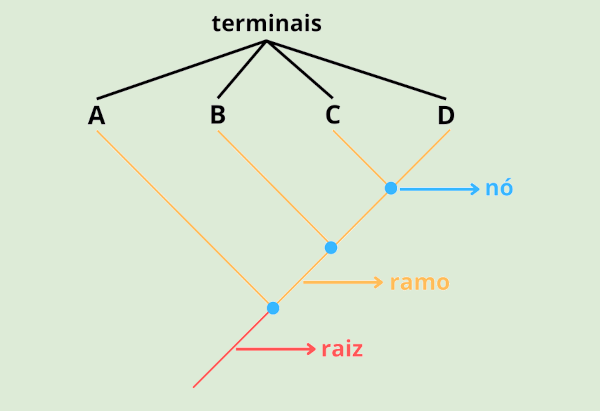Fantastic literature it's a kind of literature that explores supernatural, extraordinary or surreal elements. As an example we have the book extraordinary stories, by Edgar Allan Poe, and the work Lord of the Rings, by J. R. R. Tolkien. In Brazil, Murilo Rubião, author of books such as The pyrotechnician Zacarias, and Jose J. Veiga, author of The time of the ruminants, are the main names.
This type of literature possibly emerged between the 18th and 19th centuries, but became the focus of attention from critics and the reading public in the 20th century. Included in this category are children's and youth stories, horror or adventure narratives, but also books that privilege the nonsense, like the works of Kafka.
Read too: Fantastic tale — a literary genre that belongs to fantastic literature
Topics of this article
- 1 - Summary on fantastic literature
- 2 - What is fantastic?
- 3 - Characteristics of fantastic literature
- 4 - Main authors of fantastic literature
- 5 - Main works of fantastic literature
- 6 - Origin of fantastic literature
- 7 - Fantastic Literature in Brazil
- 8 - Solved exercises on fantastic literature
fantasy literature summary
The fantastic is associated with what is absurd, extraordinary and supernatural.
Fantastic literature is characterized by its surreal, illogical and mysterious aspect.
Mary Shelley, Edgar Allan Poe and Oscar Wilde are famous authors of this type of literature.
In Brazil, the two main authors of fantastic literature are José J. Veiga and Murilo Rubião.
What is fantastic?
the fantastic is everything that extrapolates reality, that contradicts the laws of physics. It is, therefore, an extraordinary, unbelievable, supernatural event. The fantastic elements, in a literary text, are merged with others of a real character, to give verisimilitude to this text.
Do not stop now... There's more after the publicity ;)
Characteristics of fantastic literature
Fantastic literature has the following characteristics:
extraordinary characters;
impossible facts, which contradict natural phenomena;
mix of real elements with supernatural;
deformation of reality;
nonsense;
surrealist elements;
illogical character;
appreciation of the mystery.
The reader of this type of literature ends up experiencing a sense of strangeness in the face of inexplicable events. The level of strangeness can be lower or higher according to the characteristics of each work. Thus, an author, like Kafka, can explore more the nonsense. Already Edgar Allan Poe, the mystery. While writers like J. R. R. Tolkien, the adventure.
Therefore, fantastic literature can present works with entertainment character but also narratives that make existential reflections or even present social character. Thus, this category of literature is not restricted to children's or youth books, nor to works of mass literature.
Main authors of fantastic literature

Mary Shelley (1797-1851) — England
Hans Christian Andersen (1805-1875) — Denmark
Edgar Allan Poe (1809-1849) — U.S
Lewis Carroll (1832-1898) — England
Bram Stoker (1847-1912) — Ireland
Robert Louis Stevenson (1850-1894) — Scotland
oscar wilde (1854-1900) — Ireland
Horacio Quiroga (1878-1937) — Uruguay
Franz Kafka (1883-1924) — Czech republic
j. R. R. Tolkien (1892-1973) — England
F. Scott Fitzgerald(1896-1940) — U.S
Alejo Carpentier (1904-1980) — Cuba
Italo Calvino (1923-1985) — Italy
Gabriel Garcia Marquez (1927-2014) — Colombia
Manuel Scorza (1928-1983) — Peru
Milan Kundera (1929-) — Czech republic
Isabel Allende (1942-) — Chile
Reinaldo Arenas (1943-1990) — Cuba
Stephen King (1947-) — U.S
j. K. Rowling (1965-) — England
Major works of fantasy literature
frankenstein (1818) by Mary Shelley
extraordinary stories (1833-1845) by Edgar Allan Poe
The Little Mermaid (1837) by Hans Christian Andersen
Alice in Wonderland (1865) by Lewis Carroll
The Doctor and the Monster (1886) by Robert Louis Stevenson
The portrait of Dorian Gray (1890) by Oscar Wilde
Dracula (1897) by Bram Stoker
the metamorphosis (1915) by Franz Kafka
jungle tales (1918), by Horacio Quiroga
The Curious Case of Benjamin Button (1922), by F. Scott Fitzgerald
the kingdom of this world (1949) by Alejo Carpentier
Lord of the Rings (1954-1955), by J. R. R. Tolkien
the mind-blowing world (1966), by Reinaldo Arenas
One hundred years of Solitude (1967), directed by Gabriel García Márquez
the invisible cities (1972) directed by Italo Calvino
Garabombo, the invisible (1972) by Manuel Scorza
Carrie (1974) by Stephen King
The Book of Laughter and Forgetfulness (1979) directed by Milan Kundera
the house of spirits (1982), directed by Isabel Allende
Harry Potter (1997-2007), by J. K. Rowling
Origin of fantastic literature
It is not known exactly what is the origin of fantastic literature. Researchers on this subject usually place its emergence between the 18th and 19th centuries, but it was from the 20th century onwards that this type of literature began to draw more attention from both readers and specialized critics.
See too: history of fairy tales
Fantastic Literature in Brazil
At the Brazil, making use of fantastic elements in all or most of his works, the two main authors of fantastic literature are:
Jose J. Veiga (1915-1999) — author of The time of the ruminants (1966), among others
Murilo Rubião (1916-1991) — author of The pyrotechnician Zacarias (1974), among others
However, there are also Brazilian writers who experienced the refantasticalismin some of his works, such as:
Joaquim Manuel de Macedo (1820-1882)
Machado de Assis (1839-1908)
Monteiro Lobato (1882-1948)
Mario de Andrade (1893-1945)
Erico Verissimo (1905-1975)
José Cândido de Carvalho (1914-1989)
Next, some famous brazilian works with traces of fantastic literature:
the magic spyglass (1869) — Joaquim Manuel de Macedo
The Posthumous Memoirs of Bras Cubas (1881) — Machado de Assis
Yellow Woodpecker Site(1920-1947) — Monteiro Lobato
Macunaíma (1928) — Mario de Andrade
Incident in Antares (1971) — Erico Verissimo
The Colonel and the Werewolf (1974) — José Candido de Carvalho
Solved exercises on fantastic literature
question 1
(USP)
Literary texts are works of discourse, which lack the immediate referentiality of current language; poetic, abolish, “destroy” the surrounding, everyday world, thanks to the unrealizing function of the imagination that builds them. And they trap us in the web of their language, to which they owe the power of aesthetic appeal that ensnares us; The other world, unreal, configured in them seduces us [...]. However, from joining this “paper world”, when we return to reality, our experience, expanded and renewed by experience of the work, in the light of what it revealed to us, makes it possible to rediscover it, feeling and thinking about it differently and new. The illusion, the lie, the pretense of fiction, clarifies reality by disconnecting from it, transfiguring it; and clarifies it now insight that it provoked in us.
Benedito Nunes, “Ethics and Reading”, by Paper Sieve.
What I needed was to read a fantastic novel, a silly novel, in which men and women were absurd creations, not hurting each other, betraying each other. Easy stories, no complicated souls. Unfortunately, these readings no longer move me.
Graciliano Ramos, Anguish.
Unpleasant, stuffy romance, dirty environment, populated by rats, full of rot, garbage. No concessions to public taste. Crazy, unnerving soliloquy.
Graciliano Ramos, Memories of Prison, in a note about his book Anguish.
Benedito Nunes' argument, around the artistic nature of literature, leads to the conclusion that the work only assumes a transforming function if
A) establishes a counterpoint between fantasy and the world.
B) uses language to inform about the world.
C) instills in the reader a reflective attitude towards the world.
D) offers the reader a numbing compensation for the world.
E) leads the reader to ignore the real world.
Resolution:
Alternative C
According to Benedito Nunes, “from joining this ‘paper world’, when we return to reality, our experience, expanded and renewed by the experience of the work, in the light of what it revealed to us, makes it possible to rediscover it, feeling it and thinking about it in a different and new way”. Therefore, for him, the work only assumes a transforming function if it “instills in the reader a reflective attitude before the world", since the "illusion, the lie, the pretense of fiction, clarifies the real by disconnecting from him, transfiguring him; and clarifies it now insight that it provoked in us”. Meanwhile, the narrator of Graciliano Ramos, in Anguish, aims to “ignore the real world”, by wanting to “read a fantastic novel, a silly romance, in which men and women were absurd creations, were not hurting themselves, betraying themselves. Easy stories, without complicated souls”.
question 2
The first dragons that appeared in the city suffered a lot from the backwardness of our customs. They received precarious teachings and their moral formation was irremediably compromised by the absurd discussions that arose with their arrival in the place.
[...]
Odoric, the oldest of the dragons, brought me the greatest setbacks. Awkwardly nice and mischievous, he fussed all over the presence of skirts. Because of them, and mainly because of an innate laziness, I skipped classes. The women thought he was funny and there was one who, in love, left her husband to live with him.
I did everything to destroy the sinful connection and I couldn't separate them. They faced me with a dull, impenetrable resistance. My words lost their meaning on the way: Odorico smiled at Raquel and the latter, reassured, would bend over the clothes she was washing again.
[...]
RUBIÃO, Murilo. The dragons. In: ______. complete work. São Paulo: Companhia das Letras, 2010.
This short story by Murilo Rubião is an example of fantastic literature because:
A) makes a social critique by mentioning “the backwardness of our customs”.
B) presents a realistic character when revealing the adultery between a married woman and Odorico.
C) is linked to a Christian ideology and considers the relationship between Odorico and the married woman to be “sinful”.
D) has a romantic character, since the lovers did not allow their love relationship to be destroyed.
E) brings dragons as characters in the work, in addition to personifying them.
Resolution:
Alternative E
What makes Murilo Rubião's tale considered fantastic is the presence of dragons in the narrative, since these animals do not exist in the real world. Furthermore, the situation becomes even more absurd when dragons like Odorico are described with characteristics humanities, such as having a moral background, being nice and mischievous, as well as having a romantic relationship with a woman.
By Warley Souza
Literature Teacher
Know what a fantastic tale is. Know your structure. Find out who are the main authors of fantastic literature in Brazil and in the world.
Learn more about the American writer Edgar Allan Poe. Get to know a little about his life, which are his works and some striking phrases of his authorship.
Meet the modernist writer Erico Verissimo. Find out what are the main characteristics of his works. Also, read some quotes by this author.
Learn more about Gabriel García Márquez: his biography, works, literary characteristics that made him eternal and some of his famous phrases.
Between the fantastic and the dark: Learn more about the history of fairy tales!
Click here to meet José J. Veiga, Brazilian author linked to magical realism. Understand the characteristics of his works. And read some of the author's sentences.
Click and find out what are the main characteristics of literary language. Know its importance to the art of writing.
Click here and meet the Brazilian writer Machado de Assis. Find out what are the main characteristics of his works. Understand the dimension of your legacy.
Access to learn about some elements of the novel Memórias Póstumas de Brás Cubas. See the summary, analysis of the work and a description of the main characters.
Find out who the Brazilian writer Monteiro Lobato was. Find out what are the main characteristics of his works. Also, read some of the author's sentences.


